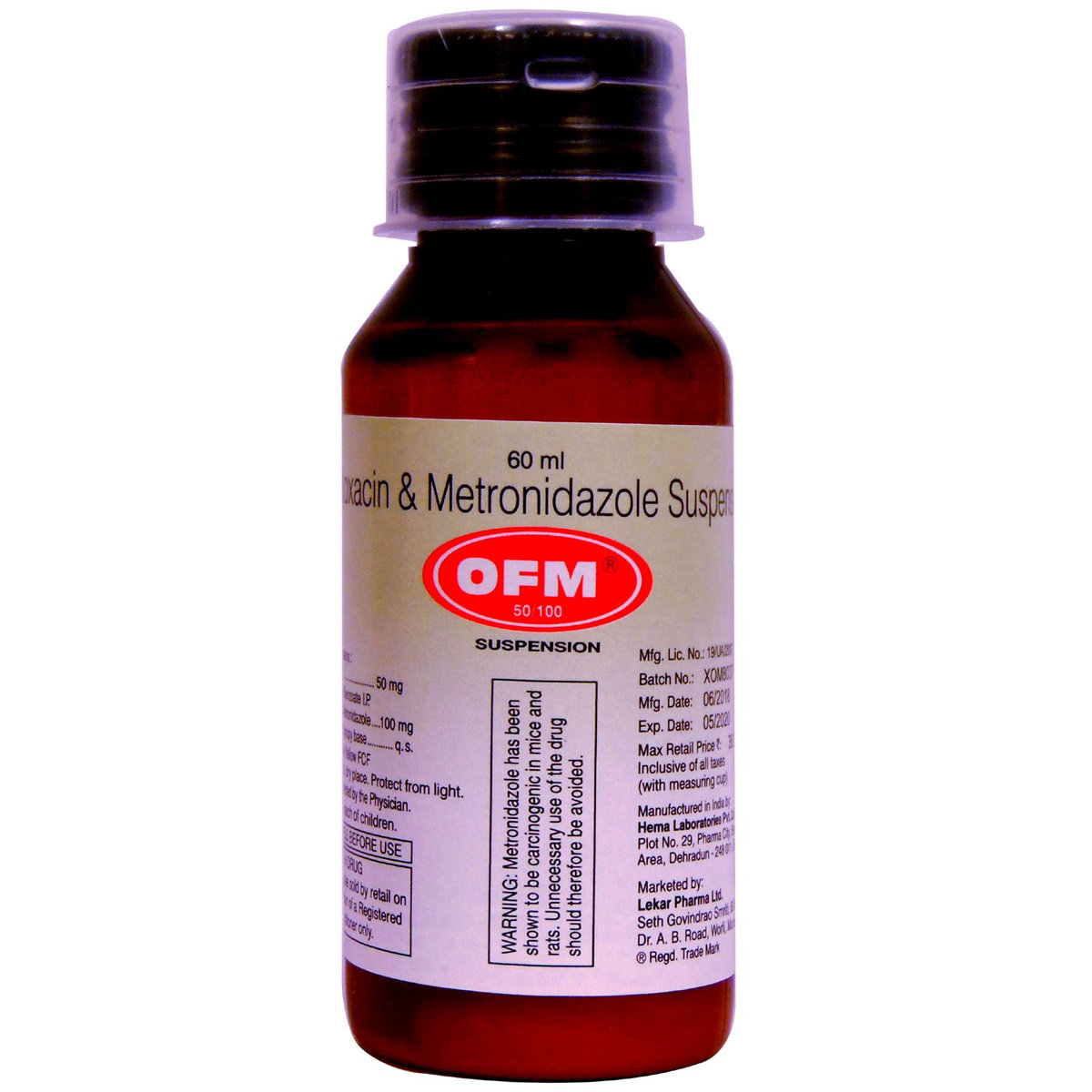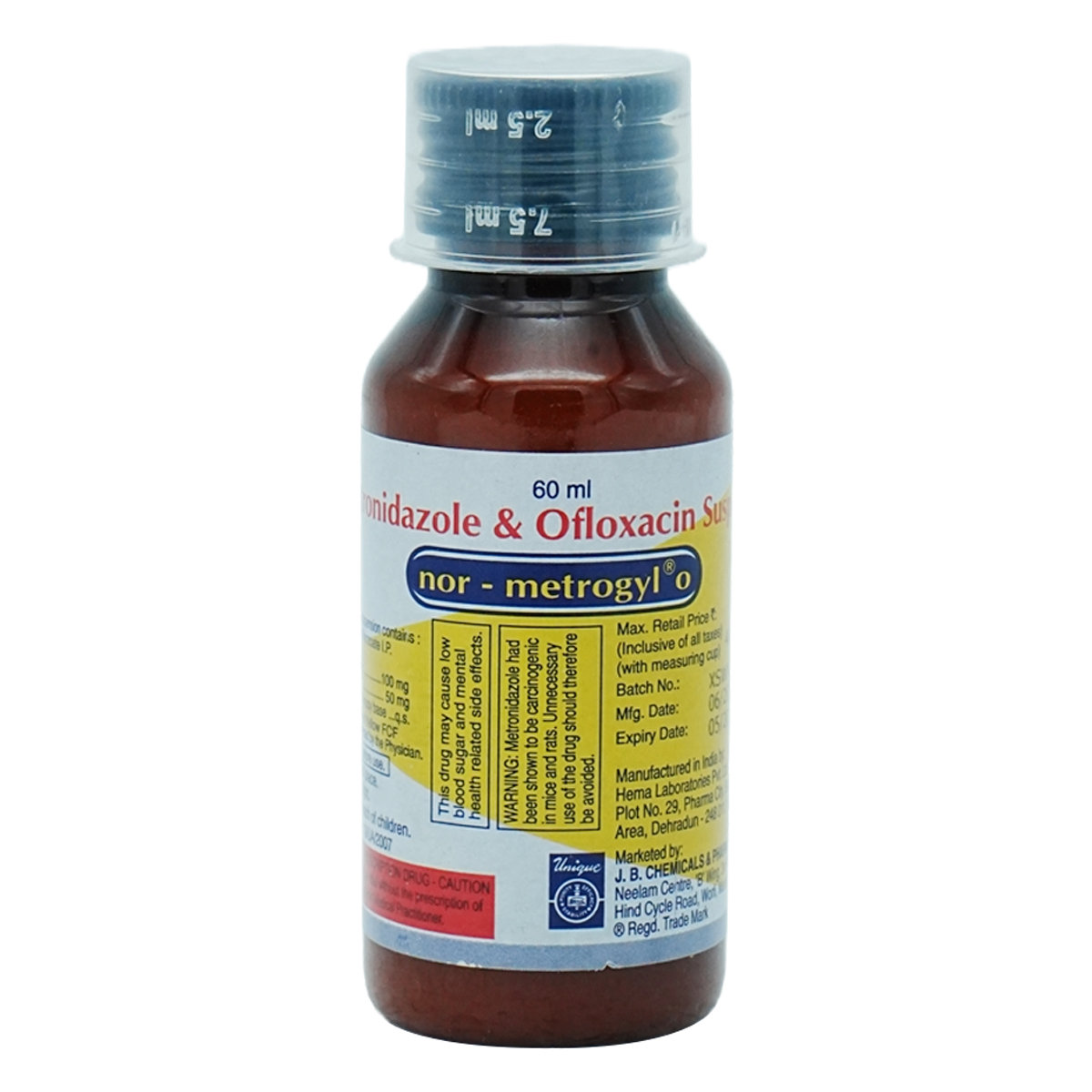Oflomac-M Suspension 60 ml

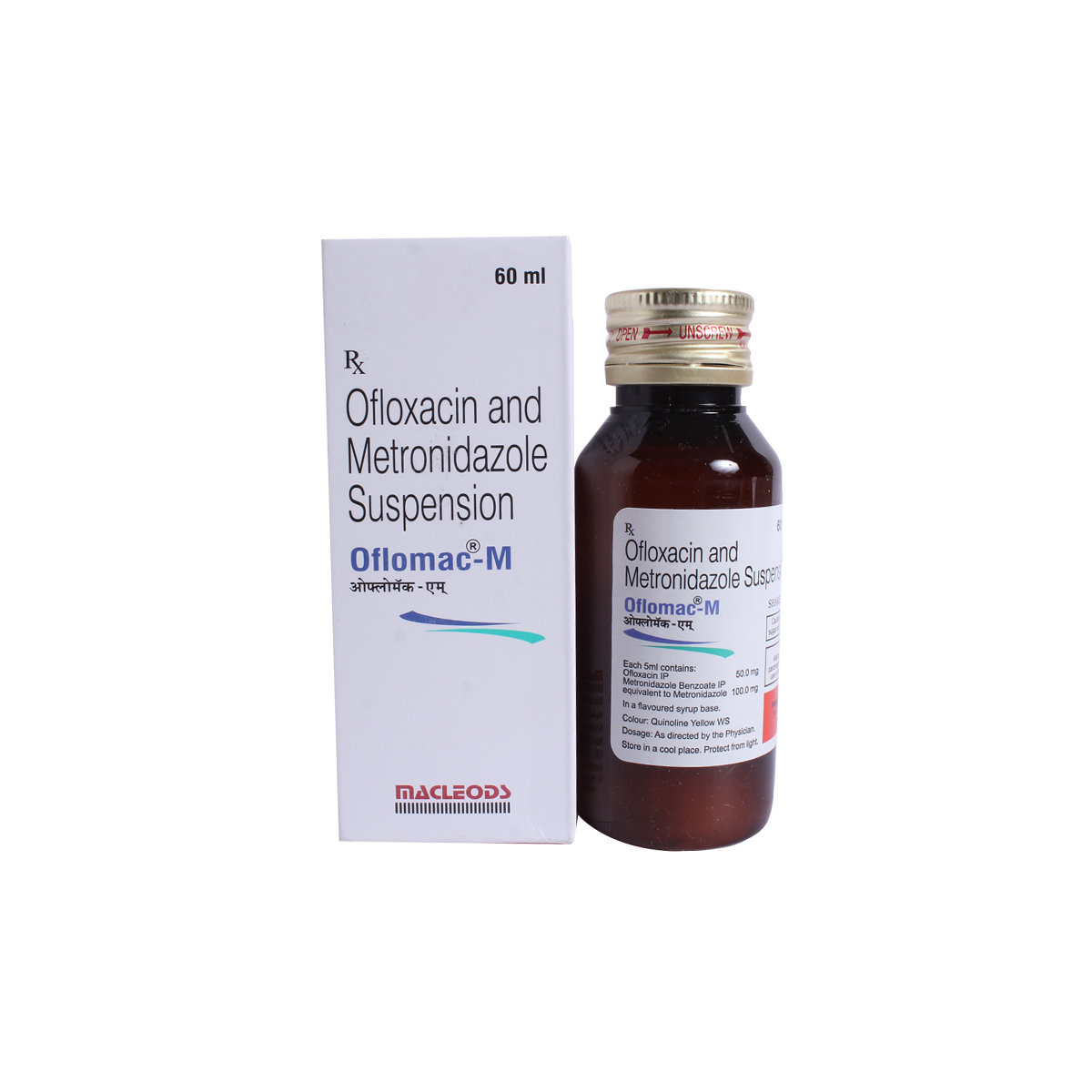
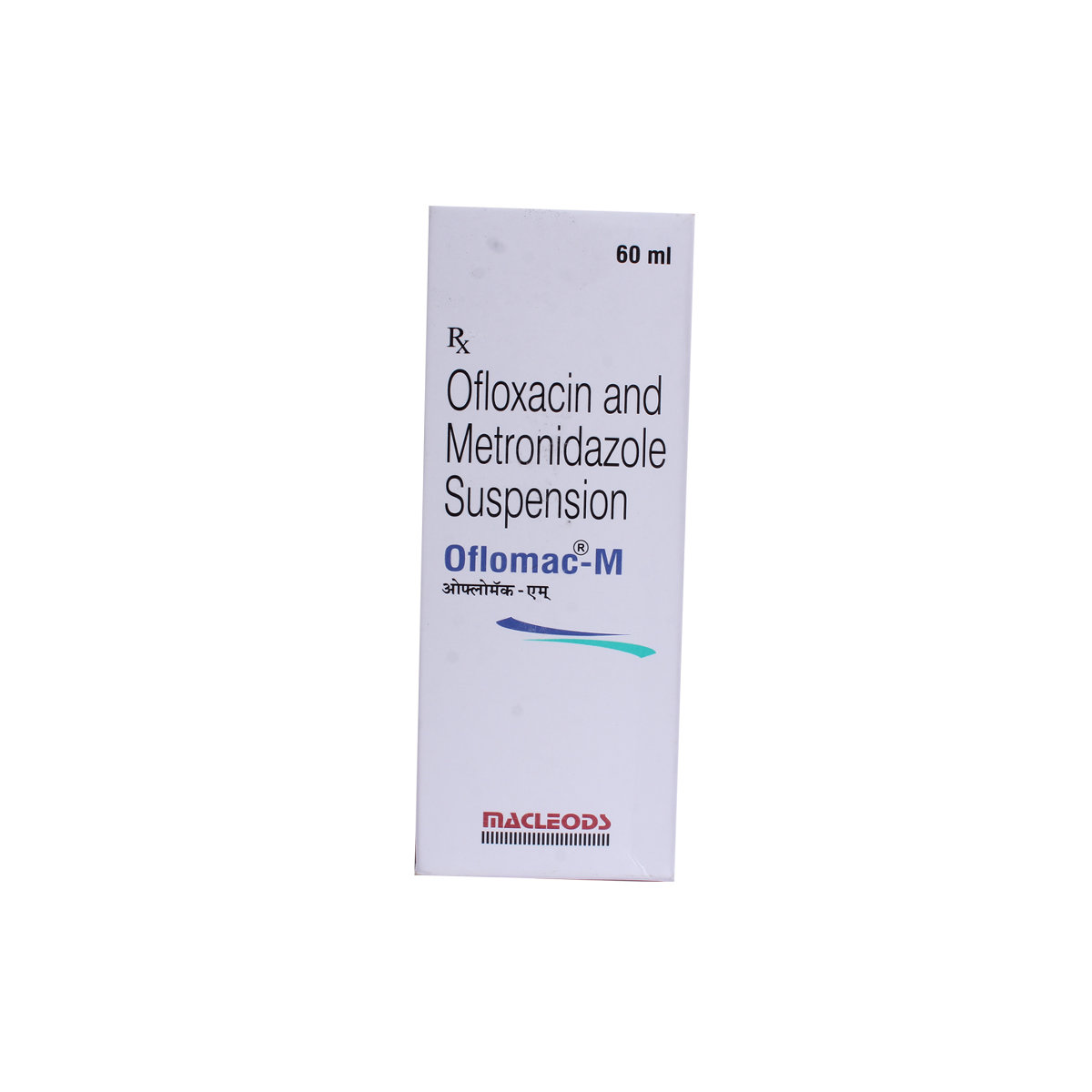
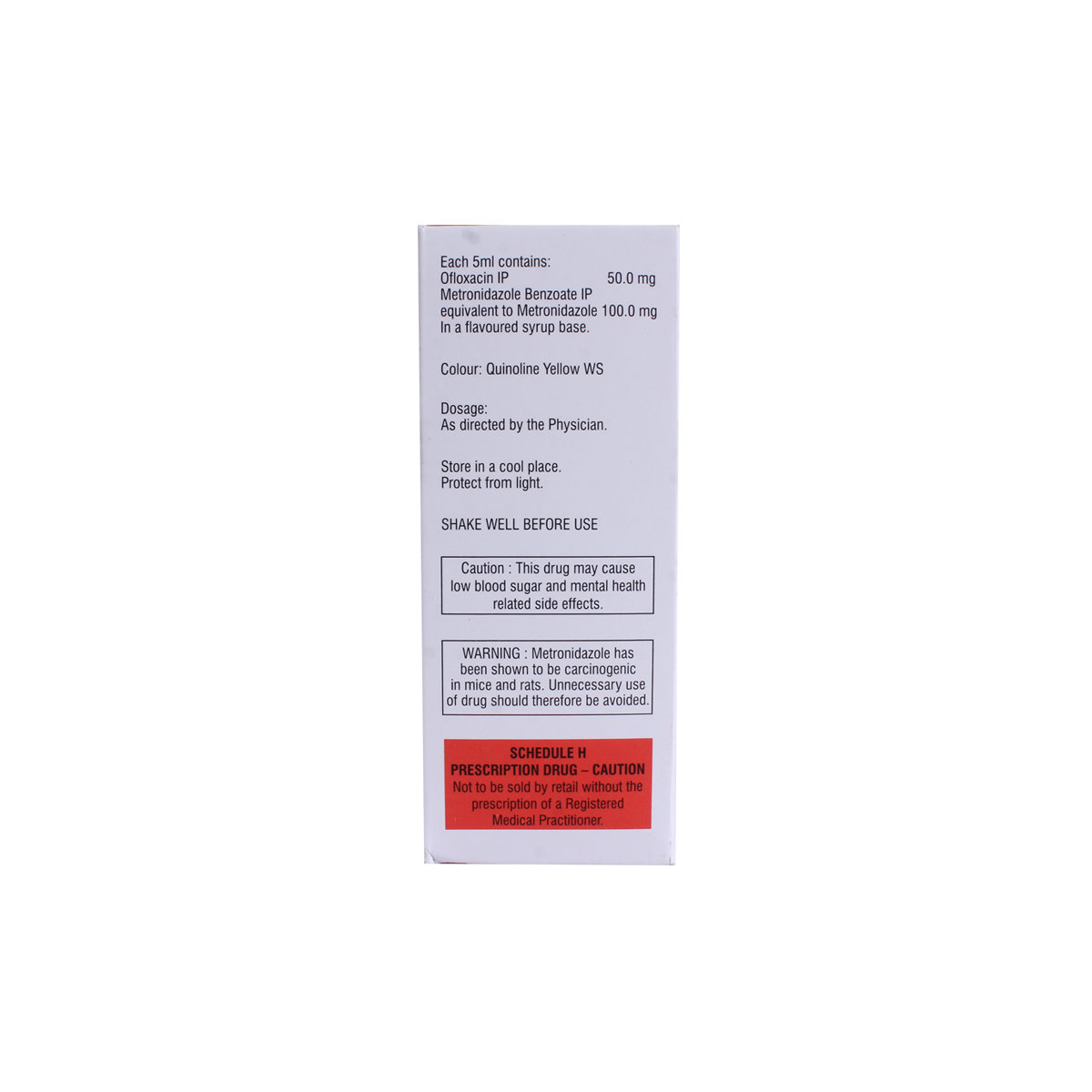




MRP ₹64.5
(Inclusive of all Taxes)
₹9.7 Cashback (15%)
Selected Pack Size:60 ml
60 ml ₹58.1
(₹0.97 per ml)
In Stock
30 ml ₹58.1
(₹1.94 per ml)
In Stock
Provide Delivery Location
Online payment accepted
 Prescription drug
Prescription drugWhats That
Composition :
Manufacturer/Marketer :
Consume Type :
Expires on or after :
Return Policy :
About Oflomac-M Suspension
Oflomac-M Suspension is a combination of antibacterial (ofloxacin) and anti-amoebic (metronidazole) used to treat various infections caused by bacteria and dysentery caused due to amoeba. A bacterial infection is a condition in which harmful bacteria enter, multiply, and infect our bodies. It can target any body part and multiple very quickly. Amoebic dysentery can be caused due to Entamoeba histolytica, Giardia lamblia, or Clostridium difficile.
Oflomac-M Suspension is a combination of two antibiotics that include Ofloxacin and Metronidazole. Ofloxacin prevents the division of bacterial cells. It also inhibits the repairing of bacterial cells. Both these actions lead to the killing of the bacteria. Metronidazole kills parasites and anaerobic bacteria that are responsible for causing infections. It works by damaging their DNA. Both are bactericidal in nature, and collectively they help in treating the disease effectively.
Take Oflomac-M Suspension as prescribed. Your doctor will recommend how often you take Oflomac-M Suspension based on your medical condition. In some cases, you may experience nausea, vomiting, upset of stomach, loss of appetite, dry mouth, and metallic taste. Metronidazole can also cause headache, dizziness, drowsiness, and confusion. Most of these side effects of Oflomac-M Suspension do not require medical attention and gradually resolve over time. However, if the side effects are persistent, reach out to your doctor. If you experience any allergic reaction symptoms such as rashes, itching, swelling, shortness of breath, etc., please consult your doctor immediately.
It is not advisable to stop taking Oflomac-M Suspension suddenly to avoid unpleasant side effects. The full course prescribed by the doctor should be completed. Inform your doctor if you have any lung disease, epilepsy, sleeping disorder, or difficulty sleeping (sleep apnoea), severe liver disease, or problem with alcohol or other prescription recreational drugs. Oflomac-M Suspension should not be used by the pregnant women (especially during the first trimester), breastfeeding mother and patients with liver diseases, low blood white cells (leukopenia), seizures (fits), gastro intestine diseases (like Crohn's disease, Inflammatory bowel disease etc.) and other neurological related diseases. Do not drive or operate heavy machinery as it can lower your mental alertness and cause dizziness.
Uses of Oflomac-M Suspension
Directions for Use
Key Benefits
Oflomac-M Suspension is a combination of two antibiotics that include Ofloxacin and Metronidazole. Ofloxacin prevents the division of bacterial cells. It also inhibits the repairing of bacterial cells. Both these actions lead to the killing of the bacteria. Metronidazole kills parasites and bacteria that are responsible for causing infections. It works by damaging their DNA. Both are bactericidal in nature.
Storage
- Get enough sleep. Maintain a regular sleep cycle.
- Eat a healthy diet and exercise regularly.
- Manage stress with yoga or meditation.
- Limit alcohol and caffeine.
- Avoid driving or operating machinery unless you are alert.
- Manage stress by practising deep breathing, yoga or meditation.
- Participating in activities you enjoy, or exercising may also help manage agitation.
- Get enough sleep. Maintain a regular sleep cycle.
- Exercise regularly. Try physical activities like walking, running, or dancing.
- Talk to your doctor about your back pain and potential medication substitutes or dose changes.
- Try yoga or Pilates and other mild stretching exercises to increase flexibility and strengthen your back muscles.
- To lessen the tension on your back, sit and stand upright and maintain proper posture.
- To alleviate discomfort and minimize inflammation, apply heat or cold packs to the afflicted area.
- Under your doctor's supervision, think about taking over-the-counter painkillers like acetaminophen or ibuprofen.
- Make ergonomic adjustments to your workspace and daily activities to reduce strain on your back.
- To handle tension that could make back pain worse, try stress-reduction methods like deep breathing or meditation.
- Use pillows and a supportive mattress to keep your spine in the right posture as you sleep.
- Back discomfort can worsen by bending, twisting, and heavy lifting.
- Speak with a physical therapist to create a customized training regimen to increase back strength and flexibility.
- Eat a balanced diet rich in fruits, vegetables, and whole grains to support overall health.
- Include foods high in omega-3 fatty acids, like salmon and walnuts, to support eye health.
- Stay hydrated by drinking plenty of water.
- Engage in regular physical activity, like walking or yoga, to improve mobility and balance.
- Practice stress-reducing techniques, like meditation or deep breathing, to manage emotional challenges.
- Establish a daily routine to maintain independence and organization.
- Consider learning Braille or using assistive technologies to enhance daily life.
- Remember, managing depression as a side effect of medication requires patience, persistence, and collaboration with your healthcare team.
- Tell your doctor about your depression symptoms to adjust medication.
- Consult a therapist or counsel for emotional support.
- Engage in regular exercise to release endorphins (neurotransmitters).
- Practice stress-reducing techniques like meditation and deep breathing.
- Build a support network of friends, family, and support groups.
- Establish a consistent sleep schedule.
- Eat a nutritious diet rich in fruits, vegetables, and whole grains.
- Limit or avoid alcohol and recreational substances.
- Keep a mood journal to track symptoms and progress.
- To the affected part, apply warm compresses to get a temporary relief.
- Rinse your eye carefully with clean water and try to blow any dust particle that could have entered.
- Take over the counter medication to lubricate your eye or if there is pain due to allergy to soothe the eye.
- If there is persistent pain in your eye, consult your doctor and follow the medication immediately.
Drug Warnings
If you are allergic to ofloxacin, metronidazole, or any other antibacterial or anti-amoebic agents, please inform your doctor to avoid any unwanted side effects like swallowing or breathing problems, swelling of your lips, face, throat, or tongue. Taking Oflomac-M Suspension may increase the chances of developing tendinitis (swelling of a tissue that joins a bone to a muscle) or a tendon rupture. Dairy products should be avoided along with Oflomac-M Suspension. And also, exposure to sunlight should be avoided while taking Oflomac-M Suspension as it may cause increased phototoxicity or photosensitivity. Patients with an irregular heartbeat (QT prolongation) should tell their doctor before taking Oflomac-M Suspension. Some medicines like pain killers (ibuprofen or diclofenac,) anti-asthma (theophylline), anti-diabetic (glibenclamide), anti-gout (probenecid), anti-cancer (5-fluorouracil), antidepressant (lithium), antiepileptic (phenobarbital, phenytoin), blood thinner (warfarin) should not be taken with Oflomac-M Suspension to avoid worsening of the condition. Oflomac-M Suspension should not be given to the pregnant mother (during the first trimester) and in nursing mothers as it passes into the breast milk. Please inform you, doctor, before taking Oflomac-M Suspension if you have a history of problems with your liver, blood, low white blood cell count (leukopenia), nervous system (convulsions). Do not drink alcohol with Oflomac-M Suspension as it may cause flushing and drowsiness which can alter your mental alertness.
Drug-Drug Interactions
Drug-Drug Interactions
Login/Sign Up
Using Mesoridazine together with Oflomac-M Suspension 60 ml can increase the risk of an irregular heart rhythm that may be serious.
How to manage the interaction:
Taking Mesoridazine with Oflomac-M Suspension 60 ml is not recommended, please consult your doctor before taking it. You should seek immediate medical attention if you develop sudden dizziness, lightheadedness, fainting, shortness of breath, or heart palpitations. Do not stop using any medications without talking to a doctor.
Coadministration of Oflomac-M Suspension 60 ml with Quinidine can increase the risk or severity of irregular heart rhythms.
How to manage the interaction:
Taking Oflomac-M Suspension 60 ml with Quinidine together is generally avoided as it can result in an interaction, it can be taken if your doctor has advised it. However, if you experience sudden dizziness, lightheadedness, fainting, shortness of breath, chest pain or tightness, rapid heartbeat, or memory loss, contact a doctor immediately. Do not discontinue any medications without consulting a doctor.
Coadministration of Oflomac-M Suspension 60 ml with Pimozide can increase the risk or severity of irregular heart rhythms.
How to manage the interaction:
Taking Oflomac-M Suspension 60 ml with Pimozide together can result in an interaction, it can be taken if your doctor has advised it. However, if you experience sudden dizziness, lightheadedness, fainting, shortness of breath, chest pain or tightness, rapid heartbeat, or memory loss, contact a doctor immediately. Do not discontinue any medications without consulting a doctor.
Coadministration of Oflomac-M Suspension 60 ml with Saquinavir can increase the risk or severity of irregular heart rhythms.
How to manage the interaction:
Taking Oflomac-M Suspension 60 ml with Saquinavir together is generally avoided as it can result in an interaction, it can be taken if your doctor has advised it. However, if you experience sudden dizziness, lightheadedness, fainting, shortness of breath, chest pain or tightness, rapid heartbeat, or memory loss, contact a doctor immediately. Do not discontinue any medications without consulting a doctor.
Using bepridil together with Oflomac-M Suspension 60 ml drugs can increase the risk of an irregular heart rhythm that may be serious.
How to manage the interaction:
Taking Oflomac-M Suspension 60 ml with Bepridil can cause an interaction, please consult your doctor before taking it. You should seek immediate medical attention if you develop sudden dizziness, lightheadedness, fainting, or fast or pounding heartbeats. Do not stop using any medications without consulting a doctor.
Coadministration of Oflomac-M Suspension 60 ml with Dronedarone can increase the risk or severity of irregular heart rhythm.
How to manage the interaction:
Taking Oflomac-M Suspension 60 ml with Dronedarone together can result in an interaction, it can be taken if your doctor has advised it. However, if you experience sudden dizziness, lightheadedness, fainting, shortness of breath, chest pain or tightness, rapid heartbeat, or memory loss, contact a doctor immediately. Do not discontinue any medications without consulting a doctor.
Using halofantrine together with Oflomac-M Suspension 60 ml can increase the risk of an irregular heart rhythm that may be serious.
How to manage the interaction:
Taking Oflomac-M Suspension 60 ml with Halofantrine can cause an interaction, please consult your doctor before taking it. You should seek immediate medical attention if you develop sudden dizziness, lightheadedness, fainting, shortness of breath, or heart palpitations. Do not stop using any medications without talking to a doctor.
The combination of Amiodarone and Oflomac-M Suspension 60 ml may significantly increase the risk of an abnormal heart rhythm.
How to manage the interaction:
Although Amiodarone and Oflomac-M Suspension 60 ml interact, it can be taken if prescribed by a doctor. If you get dizziness, lightheadedness, fainting, or fast or racing heartbeats, consult a doctor. Do not stop taking any medications without consulting a doctor.
Coadministration of Oflomac-M Suspension 60 ml with Thioridazine can increase the risk or severity of irregular heart rhythms.
How to manage the interaction:
Taking Oflomac-M Suspension 60 ml with Thioridazine together is generally avoided as it can result in an interaction, it can be taken if your doctor has advised it. However, if you experience sudden dizziness, lightheadedness, fainting, shortness of breath, chest pain or tightness, rapid heartbeat, or memory loss, contact a doctor immediately. Do not discontinue any medications without consulting a doctor.
Coadministration of Oflomac-M Suspension 60 ml with Sotalol can increase the risk or severity of irregular heart rhythms.
How to manage the interaction:
Taking Oflomac-M Suspension 60 ml with Sotalol together is generally avoided as it can result in an interaction, it can be taken if a doctor has advised it. If you experience sudden dizziness, lightheadedness, fainting, shortness of breath, chest pain or tightness, rapid heartbeat, or memory loss, contact a doctor. Do not discontinue any medications without consulting a doctor.
Drug-Food Interactions
Drug-Food Interactions
Login/Sign Up
Diet & Lifestyle Advise
- Do not drink or eat a lot of caffeine-containing products such as coffee, tea, energy drinks, cola, or chocolate. Oflomac-M Suspension may increase nervousness, sleeplessness, and anxiety caused by caffeine.
- Probiotics should be taken after taking the full course of Oflomac-M Suspension in order to restore some healthy bacteria in the intestines that may have been killed. Taking probiotics after antibiotic treatment can reduce the risk of antibiotic-associated diarrhea. Certain fermented foods like yogurt, cheese, sauerkraut, kombucha, and kimchi can help restore the intestine's good bacteria.
- Include more fiber-enriched food in your diet, as it can be easily digested by your gut bacteria, which helps stimulate their growth. Thus, fiber-rich foods may help restore healthy gut bacteria after a course of antibiotics. Whole grains like whole-grain bread, brown rice should be included in your diet. Make sure you drink plenty of water or other fluids every day while you are taking Oflomac-M Suspension.
- Avoid intake of alcoholic beverages with Oflomac-M Suspension as it can make you dehydrated and may affect your sleep. This can make it harder for your body to aid the Oflomac-M Suspension in fighting off infections.
Side Effects of Oflomac-M Suspension
- Nausea
- Vomiting
- Upset stomach
- Loss of appetite
- Dry mouth
- Metallic taste
- Headache
Habit Forming
Therapeutic Class
All Substitutes & Brand Comparisons
RX
Out of StockBetflox M Oral Suspension
₹43
(₹0.65/ 1ml)
32% CHEAPERRX
Out of StockBactivid M Suspension
Cadex Laboratories
₹36
(₹0.65/ 1ml)
32% CHEAPERRX
Out of StockObit M Suspension
₹27.9
(₹0.84/ 1ml)
13% CHEAPER
Product Substitutes
Drug-Diseases Interactions
Drug-Diseases Interactions
Login/Sign Up
FAQs
It is not advised to take alcohol with Oflomac-M Suspension. Taking alcohol while taking Oflomac-M Suspension can cause serious side effects such as headaches, feeling or being sick, pain in the stomach, hot flushes, a fast or irregular heartbeat, dizziness, drowsiness, etc.
Oflomac-M Suspension makes your skin sensitive to sunlight, known as photosensitivity. So, prolonged exposure to sunlight or ultraviolet light should be avoided. In case of emergency, you should always wear sunscreen before going out.
If you miss a dose of Oflomac-M Suspension, take the missed dose as soon as you remember it. However, if it's almost time for the next dose, do not take a double dose to make up for a missed one.
No. Oflomac-M Suspension is an antibacterial medicine that acts only against bacterial infections and not against viral infections . You should not take Oflomac-M Suspension without prior consulting your doctor. Self-medication is dangerous and can lower the efficacy of Oflomac-M Suspension, leading to antibiotic resistance.
Yes, intake of Oflomac-M Suspension may cause dry mouth and you might be feeling thirsty frequently. Try to drink plenty of fluids (water with electrolytes) and probiotics. You may also have a dry lip for which you can use lip balm.
Avoid intake of Oflomac-M Suspension if you have a history of problems with your liver, blood or nervous system (convulsions or fits), low white blood cell count (leukopenia).
Drug-Drug Interactions Checker List
- IBUPROFEN
- DICLOFENAC
- THEOPHYLLINE
- GLIBENCLAMIDE
- PROBENECID
- LITHIUM
- PHENOBARBITAL
- PHENYTOIN
- WARFARIN
Special Advise
You should consult a doctor if you have symptoms associated with dehydration like dry mouth, excessive thirst, wrinkled skin, little or no urination, dizziness and lightheadedness.
Disease/Condition Glossary
Bacterial Infection: A bacterial infection is a condition in which harmful bacteria enter, multiply, and infect our body. It can target any body part and multiple very quickly. When you get infected with bacteria, you can experience generalized symptoms, like fevers, chills, and fatigue. Bacteria are of various forms comprising commonly of spherical, rod, and spiral-shaped. Bacterial infections vary from minor illnesses like sore throat and ear infections to severe brain infections like meningitis and encephalitis. Few harmful bacteria that cause infections include Streptococcus, Staphylococcus, and E. coli. Anyone can become infected with a bacterial infection. People with weak immune systems or taking immunosuppressive medicine can make them more prone to bacterial infection.
Diarrhoea: It is the increase in bowel movement leading to increased and loose motions.
Dysentery: It is inflammation of the intestine, particularly the colon, caused by the bacteria Shigella.

Have a query?
Buy best Infections & Infestation products by
Cipla Ltd
Macleods Pharmaceuticals Ltd
Alkem Laboratories Ltd
Lupin Ltd
Abbott India Ltd
Sun Pharmaceutical Industries Ltd
Mankind Pharma Pvt Ltd
Micro Labs Ltd
Aristo Pharmaceuticals Pvt Ltd
FDC Ltd
Intas Pharmaceuticals Ltd
Glenmark Pharmaceuticals Ltd
Ipca Laboratories Ltd
Torrent Pharmaceuticals Ltd
Zydus Healthcare Ltd
Biochem Pharmaceutical Industries Ltd
Zuventus Healthcare Ltd
United Biotech Pvt Ltd
Hetero Drugs Ltd
Emcure Pharmaceuticals Ltd
Alembic Pharmaceuticals Ltd
Indoco Remedies Ltd
Fusion Health Care Pvt Ltd
Dr Reddy's Laboratories Ltd
Leeford Healthcare Ltd
Cadila Healthcare Ltd
Wockhardt Ltd
Zydus Cadila
GlaxoSmithKline Pharmaceuticals Ltd
Morepen Laboratories Ltd
Blue Cross Laboratories Pvt Ltd
Cadila Pharmaceuticals Ltd
Converge Biotech Pvt Ltd
Elder Pharmaceuticals Ltd
Hetero Healthcare Pvt Ltd
Pfizer Ltd
AAA Pharma Trade Pvt Ltd
Gufic Bioscience Ltd
Mylan Pharmaceuticals Pvt Ltd
Corona Remedies Pvt Ltd
Wallace Pharmaceuticals Pvt Ltd
Apex Laboratories Pvt Ltd
Medishri Healthcare Pvt Ltd
Akumentis Healthcare Ltd
Alniche Life Sciences Pvt Ltd
Hegde & Hegde Pharmaceutica Llp
Veritaz Healthcare Ltd
Ranbaxy Laboratories Ltd
Koye Pharmaceuticals Pvt Ltd
Shreya Life Sciences Pvt Ltd
Overseas Health Care Pvt Ltd
Biocon Ltd
Indchemie Health Specialities Pvt Ltd
Medley Pharmaceuticals Ltd
Brinton Pharmaceuticals Ltd
J B Chemicals & Pharmaceuticals Ltd
Unifaith Biotech Pvt Ltd
Ajanta Pharma Ltd
Biochemix Health Care Pvt Ltd
Natco Pharma Ltd
Samarth Life Sciences Pvt Ltd
Unichem International
Laborate Pharmaceuticals India Ltd
Unipark Biotech Pvt Ltd
Zymes Bioscience Pvt Ltd
Indiabulls Pharmaceuticals Pvt Ltd
Neon Laboratories Ltd
Vasu Organics Pvt Ltd
DR Johns Lab Pharma Pvt Ltd
East West Pharma India Pvt Ltd
La Renon Healthcare Pvt Ltd
Medgen Drugs And Laboratories Pvt Ltd
Novartis India Ltd
Canixa Life Sciences Pvt Ltd
Icarus Health Care Pvt Ltd
Lincoln Pharmaceuticals Ltd
Celon Laboratories Pvt Ltd
Concept Pharmaceuticals Ltd
Klm Laboratories Pvt Ltd
Nicholas Piramal India Ltd
Systopic Laboratories Pvt Ltd
Yuventis Pharmaceuticals
Capital Pharma
German Remedies Ltd
Pristine Pearl Pharma Pvt Ltd
Unison Pharmaceuticals Pvt Ltd
Aurz Pharmaceutical Pvt Ltd
Clover Health Care Pharma
Kepler Healthcare Pvt Ltd
Allites Life Sciences Pvt Ltd
Auspharma Pvt Ltd
Intra Life Pvt Ltd
Jolly Healthcare
Linux Laboratories Pvt Ltd
Ozone Pharmaceuticals Ltd
Cachet Pharmaceuticals Pvt Ltd
Comed Chemicals Ltd
Delcure Life Sciences Ltd
Fresenius Kabi India Pvt Ltd
Khandelwal Laboratories Pvt Ltd
Alcohol
Safe if prescribed
Alcohol should not be consumed while taking Oflomac-M Suspension to avoid unpleasant side-effects like flushing, lightheadedness, dizzy and drowsy.
Pregnancy
Consult your doctor
Oflomac-M Suspension should not be taken if you are pregnant or planning to have a baby. If you become pregnant while taking Oflomac-M Suspension, stop taking the medication, and contact your doctor immediately. Metronidazole should not be given in the first trimester of the pregnancy as it may cause harm to the fetus.
Breast Feeding
Consult your doctor
Oflomac-M Suspension passes in the breast milk so the nursing mother should avoid taking Oflomac-M Suspension.
Driving
Safe if prescribed
Oflomac-M Suspension can cause dizziness in some patients. If you feel dizzy, please do not operate the car.
Liver
Consult your doctor
Oflomac-M Suspension to be taken with caution, especially if you have a history of Liver diseases/conditions. The dose may have to be adjusted by your doctor.
Kidney
Consult your doctor
Oflomac-M Suspension to be taken with caution, especially if you have a history of Kidney diseases/conditions. The dose may have to be adjusted by your doctor.
Children
Safe if prescribed
Oflomac-M Suspension can be given to the children for typhoid fever, diarrhoea, stomach infection, amoebiasis, abdominal infection, diarrhoea and intestinal infection.



